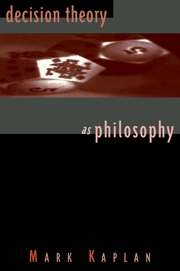Book contents
- Frontmatter
- Contents
- Preface
- Note to the Reader
- CHAPTER ONE Confidence
- CHAPTER TWO Evidence
- CHAPTER THREE The Bayesian Challenge
- CHAPTER FOUR Rational Belief
- CHAPTER FIVE The Bayesian Canon
- CHAPTER SIX Decision Theory as Epistemology
- APPENDIX 1 Principles and Definitions
- APPENDIX 2 Proofs
- APPENDIX 3 Probabilism – Some Elementary Theorems
- Bibliography
- Index
CHAPTER ONE - Confidence
Published online by Cambridge University Press: 05 June 2012
- Frontmatter
- Contents
- Preface
- Note to the Reader
- CHAPTER ONE Confidence
- CHAPTER TWO Evidence
- CHAPTER THREE The Bayesian Challenge
- CHAPTER FOUR Rational Belief
- CHAPTER FIVE The Bayesian Canon
- CHAPTER SIX Decision Theory as Epistemology
- APPENDIX 1 Principles and Definitions
- APPENDIX 2 Proofs
- APPENDIX 3 Probabilism – Some Elementary Theorems
- Bibliography
- Index
Summary
A Decision Problem
You know precious little about the election. It is being held rather far away and it has little national importance. But what you have heard – and you haven't heard much – is that the incumbent is ahead of her lone opponent. As a consequence, you find yourself more confident that the incumbent will win. That is, where h is the hypothesis that the incumbent will win, you are more confident that h than you are that ~h.
Not so for g. There is an urn containing exactly 50 black balls and 50 white, all of the same composition and size. The contents of the urn have been thoroughly mixed. One ball has been drawn, but not yet examined. g is the hypothesis that the ball drawn is black. With good reason, you are just as confident that g as you are that ~g.
Suppose I confront you with the following decision problem. Suppose I offer you a choice between
(i) a ticket which entitles you to $1 if h is true and $0 if h is false; and
(ii) a coupon which entitles you to $1 if g is true and $0 if g is false.
Suppose further that, for the purpose of solving your problem, money is all you intrinsically value and you value every dollar gained or lost equally, no matter what the size of your fortune.
- Type
- Chapter
- Information
- Decision Theory as Philosophy , pp. 1 - 44Publisher: Cambridge University PressPrint publication year: 1996

